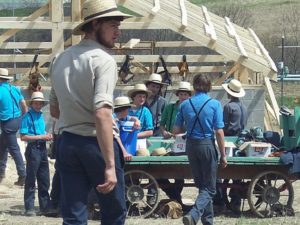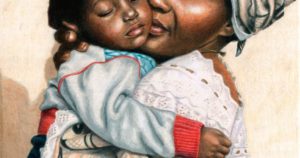Parting is such sweet sorrow,
That I shall say good night
Till it be morrow.”
So said Juliet to her Romeo, not knowing where a balcony moment of affection would lead. Committing to love opens us up to both sweet ecstasy and crushing sorrow. Shakespeare’s timeless play is at once beautiful and agonizing for that reason. We want it to end differently.
The bond of love between people is a universal mystery. It’s a vibrant, potent connection. Can you feel the chemistry between pair skaters or ice dancers when you watch the Olympics?
And of course, it’s more expansive than romantic love. Have you watched any soldiers-returning-home clips on YouTube? Millions have. Children and fathers, husbands and wives, mothers and sons…families reuniting after long separations.
Tears weave down my cheeks every time.
Parting ways for a season is hard, but completely losing our connection of love is worse.
 A documentary called, The Amish: Shunned, “follows seven people who have chosen to leave their closed and tightly-knit communities for the outside world. Each has paid deeply for their decision. Estranged from loved ones, these former Amish find themselves struggling to make their way.” The loss of connection and community seems to be much harder for these so-called prodigals, than any challenge of the modern world.
A documentary called, The Amish: Shunned, “follows seven people who have chosen to leave their closed and tightly-knit communities for the outside world. Each has paid deeply for their decision. Estranged from loved ones, these former Amish find themselves struggling to make their way.” The loss of connection and community seems to be much harder for these so-called prodigals, than any challenge of the modern world.
All or nothing choices are wrenching. As I watched my gut tightened. Six of the seven never returned. Still Amish families set a place for their “lost” family members at their dinner tables every night.
Relationships are abruptly interrupted by abandonment, divorce, or suicide. Dementia, Alzheimer’s, and mental illness gradually rob our connectedness to loved ones with a long slow goodbye. And death is so devastatingly final.
 Author Mike Mason describes listening to his mother’s voice on a tape recording after her death. “Death, it is said, wonderfully concentrates the mind. Sadly and paradoxically, we never practice a person’s presence so intently as when that one is gone. It’s almost as if, by summoning all our powers of memory and concentration, we could bring that person back and keep him or her with us…Why had I never noticed this before? In all the years of listening to my mother’s voice, never had I heard her this way. Never before had I fallen in love with the mere sound of her voice.”
Author Mike Mason describes listening to his mother’s voice on a tape recording after her death. “Death, it is said, wonderfully concentrates the mind. Sadly and paradoxically, we never practice a person’s presence so intently as when that one is gone. It’s almost as if, by summoning all our powers of memory and concentration, we could bring that person back and keep him or her with us…Why had I never noticed this before? In all the years of listening to my mother’s voice, never had I heard her this way. Never before had I fallen in love with the mere sound of her voice.”
Heroic and sacrificial things are done to fiercely protect the ones we love.
Remember the story of Eliza, the runaway slave in Uncle Tom’s Cabin? Based on an actual account, the historical novel describes the riveting story of a slave mother carrying her child across the broken ice on the Ohio River. If it were your child, about to be torn from your arms by a brutal slave trader, how emboldened would you be? Author Harriet Beecher Stowe wrote this account:
 “How many miles could you make in those few brief hours, with the darling at your bosom—the sleepy head on your shoulder—the small, soft arms holding trustingly to your neck?
“How many miles could you make in those few brief hours, with the darling at your bosom—the sleepy head on your shoulder—the small, soft arms holding trustingly to your neck?
…As a fire in her bones, the thought of her pursuer urged her on; and she gazed with longing eyes on the sullen surging waters that lay between her and liberty…The trader caught a full glimpse of her, just as she was disappearing down the bank…he was after her like a hound after a deer. In that dizzy moment, her feet…scarce seemed to touch the ground, and a moment brought her to the water’s edge…Nerved with strength such as God gives only to the desperate, with one wild cry and flying leap, she vaulted sheer over the turbid current by the shore, on to the raft of ice beyond. It was a desperate leap—impossible to anything but madness and despair.”
 This mystical and pulsating connection of one to another is part of our design. And some will do anything to keep it, even when circumstances are beyond our control.
This mystical and pulsating connection of one to another is part of our design. And some will do anything to keep it, even when circumstances are beyond our control.
“For love is as strong as death, jealously as unrelenting as the grave. Its sparks are fiery flame, the fiercest blaze of all. Mighty waters cannot quench love, rivers cannot sweep it away.” –Song of Solomon 8: 6b-7a
Stowe writes at the end of the book that truth is stranger than fiction. A missionary’s notebook described how many fugitive slaves ended up in Canada. “These shores of refuge, like the eternal shore, often unite again, in glad communion, hearts that for long years have mourned each other as lost.”
God is not a bystander. He is fully engaged in this connection of love. He created us for this love. He wept over the death of Lazarus, knowing full well that God had the power to resurrect. He also rejoices at reunions. And that’s part of our great future hope that He alone can promise—that we will be together, that we will know each other, and that sorrow, separation, and loss will be no more.
 “Your sun will no longer set, nor will your moon wane
“Your sun will no longer set, nor will your moon wane
For you will have the Lord for an everlasting light
And the days of your mourning will be over.”
–Isaiah 60:20
Is this future promise enough to anchor you in your current losses?









Thanks, Susan. My father died 24 days ago. This helps.